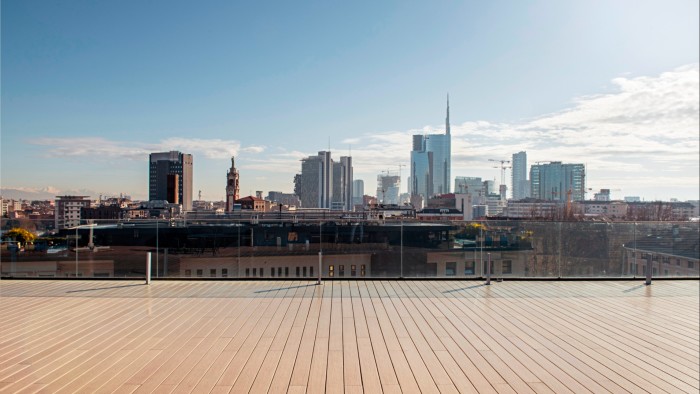Italy weans builders off Superbonus ‘drug’ after boom

Roula Khalaf, Editor of the FT, selects her favourite stories in this weekly newsletter.
Founded in 2010, Italy’s Déco first made a name for itself as a supplier of sleek, weather-resistant building materials for pool decks and outdoor cladding. It then made and sold flooring and interior wall coverings — all for use in homes, hotels, restaurants, and upmarket retail stores.
But, as Italy emerged from the trauma of its Covid-19 first wave — and months of lockdown at home — demand for the company’s products suddenly rocketed amid a frenzy for home improvements. Déco’s sales jumped from €7.1mn in 2019, before the pandemic, to €19.2mn in 2021, and then surged to €29.5mn in 2022.
“The pandemic completely changed the way you live in your house,” says Paolo Damiani, one of Déco’s three co-founders. “Once you spent most of your day at home, it changed your habits. The house became an environment that you take care of, and wanted to improve.”
“The most important thing is, none of our products is essential,” he points out. “If you buy them, it’s because you are willing to spend more than necessary to make your environment look better.”
Bergamo-based Déco is one of 41 Italian construction groups in this year’s FT ranking of Europe’s fastest growing companies. In fact, Italy accounts for almost half of the construction and engineering category this year.
Investment in construction in the country grew at a blistering 24.6 per cent in 2021, after a 5.5 per cent contraction 2020, when Covid hit. The industry continued to expand by roughly 15.4 per cent in 2022, fuelled by 25.7 per cent growth in the home renovation sector.
Overall, construction investment hit an estimated €172bn in 2022, according to Italy’s national builders’ association, ANCE.
This surge in activity reversed a decade of painful industry decline. From 2010 to 2020, total construction revenues in Italy dropped by nearly a quarter and almost a third of workers lost their jobs, according to the European Commission.
But Italy’s post-pandemic home improvement craze — among the key factors that helped spur the country’s growth over the past two years — was not driven solely by a pent-up demand for renovation projects. It was also fuelled by a generous tax incentive for homeowners to invest in energy efficiency.
Under the flagship Superbonus scheme launched in 2020, Italians could claim tax credits worth 110 per cent of any energy-efficiency work.
These credits prompted countless homeowners to upgrade their properties. Sales surged at Italian construction-related businesses, from materials makers to architects and general contractors.
“Everybody wanted to change everything,” Damiani says. “It pushed people to buy a lot of things to renew their house in every way. Whatever you used was not only free, but you made a profit.”
Déco was well positioned to benefit, though production of its specialised materials was constrained by lockdowns in China, and rising costs. For a month, it had no supplies at all.
“It was a stressful time,” Damiani says. “Production slowed but demand increased by two or three times. Floor materials [that] we normally deliver in seven days took two months.”
Material suppliers were not the only beneficiaries of the boom. EdiliziAcrobatica, a Genova-based company whose workers use ropes rather than scaffolding to carry out exterior building repairs, also experienced explosive growth.
Here, demand was buoyed by another tax incentive, the “facade bonus”, which gives property owners a 60 per cent tax credit for the cost of renovating building fronts.
The group’s revenues in Italy — its core market — jumped from €35mn in 2019 to €92mn in 2021, with revenues for 2022 estimated at €127.8mn.
EdiliziAcrobatica’s founder, Riccardo Iovino — a former sailboat captain who first learned rope climbing on masts — says his company’s technique is less expensive and faster than scaffolding, which must be transported, erected and dismantled.
“We use half the time as traditional construction techniques; we are safer; and there is less impact on the environment,” he says. “The year after Covid, we really arrived.”
Yet Italy’s construction industry is now under pressure as authorities move to scale back the Superbonus.
Concerns about fraud and the estimated €110bn cost of the scheme have prompted the government to pare back the tax credits to 90 per cent this year, with further reductions next year. The credits are also no longer tradeable as they were before, a change that is expected to reduce demand for renovations.
Though the rollback has sparked alarm in some companies, others see the reduction of the Superbonus “drug” as a necessary corrective to subdue an overheated market suffering from surging costs, and labour shortages.
Iovino believes the change will allow stronger businesses like his — which has a presence in 100 Italian cities and towns — to consolidate.
“Our objective every year is to hire 500 new ‘acrobats’, and also 25 or 30 area managers,” he says. “But, in the years of the Superbonus, it was not easy. We had a lot of competitors. You are returning to a standard market.”
Damiani said Déco’s growth, which has outpaced the growth of the construction sector overall, was not dependent on the tax incentive of the Superbonus. But he said for many businesses the consequences of the recent policy changes are as yet unclear.
“Most companies are wondering what will happen once the Superbonus is not there anymore,” he says. “We’ll see the effects in the second half — when people realise that they have to pay the money for what they actually want.”
This article has been amended to expand Paolo Damiani’s comments on Déco’s growth
Comments